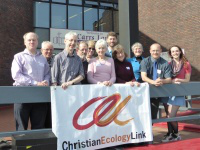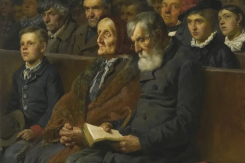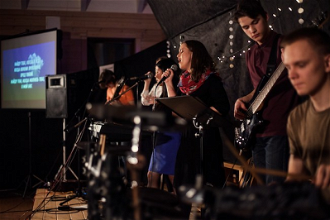Green Christian programme to develop 'Joy in Enough' manifesto

CEL organisers
Green Christians have launched a two-year programme to develop a ‘Joy in Enough’ manifesto. It will rethink how the economy could be restructured to achieve social justice, respect planet Earth’s natural limits, and set people free from the obligation to consume beyond their needs. The programme is given a special relevance today, as the UN warns that the impacts of global warming are likely to be "severe, pervasive and irreversible".
More than 100 people from across Christian denominations attended the conference ‘Joy in Enough: Awakening to a new economics’ on 29 March in Birmingham, organised by Christian Ecology Link (CEL) in association with A Rocha UK and the student campaign network Speak.
“It is unprecedented for any CEL conference to be booked up two months in advance of the event as this one was”, reported CEL Chair Paul Bodenham, “and this shows we are riding the wave of something very significant”. Speaking in front of a CEL banner reading, ‘CEL believes in a gospel for all creation’, he suggested there was a groundswell of feeling that something has gone wrong in the way ‘orthodox’ economics is serving society and the planet. The ‘Joy in Enough’ project is empowering Christians to look at alternatives, bringing together the two disciplines of economics and theology
In her opening reflection, Catholic theologian Dr Mary Grey reflected that in CEL’s network, “we have prioritised a right relationship with the earth as a pre-requisite for communal well-being and flourishing, part of the vision we share of the Kingdom of God as a kingdom, a shalom of right relationship”. She felt key questions were: “How can society find its way back from a ‘culture of more’ to a ‘culture of enough’?” and “How can we break the fetters of addiction to consumerism and the domination of the free market system?” Human society is yearning, she said, “for recovery of our collective soul…. where desires are satisfied and fulfilled in justice for all vulnerable communities and a sustainable economy for the Earth”. A return to the Christian roots of simplicity and joy is called for.
Keynote speaker Dr Dan O’Neill, Lecturer at Leeds University and Chief Economist at the Centre for the Advancement of the Steady State Economy, suggested that a global economy should operate within strict boundaries or caps for emissions and resource use, and prioritise the well-being of all over the luxurious living of the few. To that end we need international agreements on the implementation and the enforcement of such caps, which would address environmental crises, particularly climate change and biodiversity loss. We need fundamental reform of financial systems, including curtailing the power of the banks to create debt. Policies aimed at dismantling the ‘culture of consumerism’ created by powerful corporate marketing are also necessary.
Dr O’Neill recommended a move to more local, low-carbon economic activities, including more investment in energy efficiency and renewable energy. Signs of change are there already, in his view, as he pointed out that in the UK there are 10,000 community interest companies which take into account environmental and social priorities. Work-sharing, along with the just redistribution of employment hours and income will be other key requirements. The most profound call was for change in our national economic goals and the way we measure progress. With less emphasis on the GDP, more importance could be given to measures of ecosystem health, quality of life and of equality. Currently, economic growth, which supposes that an affluent elite will enable wealth to ‘trickle’down’ to poorer people, should be replaced by more equality of income.
During a general discussion, it was felt that church buildings should be models of sustainability and that existing initiatives should continue to be pushed, such as Eco-Congregation, the Live Simply Parish Award in the Catholic Church, and A Rocha UK’s Living Lightly campaign. Operation Noah’s campaign to urge churches to disinvest from fossil fuel companies is important, and the ecocell initiative of CEL, which helps small Christian groups work together to reduce their carbon footprints. Christians, especially local church congregations, need to act prophetically speaking out against consumerism and living an alternative simple lifestyle. Reclaiming the Sabbath rest is another goal, and there was also a call to reclaim Christmas as a more simple religious celebration. A cheer went up around the room when Tony Emerson, coordinator of the ‘Joy in Enough’ project, said, “instead of using the term ‘economic growth’, why not call it ‘economic obesity’”.
Five working groups prepared papers and workshops for the conference, and will continue their work driving the ‘Joy in Enough’ agenda forward and working towards the ‘Joy in Enough’ manifesto. They are welcoming people to join the movement to spread the concept to a wider audience. The groups include a theological one, which is articulating the imperatives in scripture and theology for a post-growth economy, and strategies for mission and evangelisation for the transition. Other groups are focusing on the big trans-boundary questions of limiting resource use, tackling emissions targets, and minimising the production of waste; reform of the financial sector; tackling social inequality and promoting work-time reductions and work sharing; and challenging consumerism. The overall thrust is moving away from a competitive, individualistic culture to one of cooperation and altruism.
Source: CEL


















